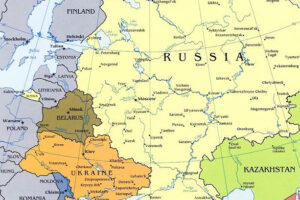RIA Novosti: Russia Discloses Ukrainian Ultranationalist Leader’s Nazi Past

MOSCOW, April 3 (RIA Novosti) – Russia’s Defense Ministry published on its website Thursday secret documents revealing that Ukrainian ultranationalist Stepan Bandera, who is considered as a national hero by his supporters, was involved in atrocities against civilian population in western Ukraine during World War II.
The classified documents which were previously known to just a few specialists include reports by the Red Army troops and leaders of Ukrainian partisans, revealing the creation and development of a nationalist movement in Ukraine and its collaboration with the Nazis.
Among the documents, which are of particular interest, is a letter dating back from January 19, 1942, from Lavrentiy Beria, Stalin’s head of the Soviet secret police, to Lev Mekhlis, head of the Political Commissars in the Red Army. In the letter, Beria informed Mekhlis of attempts by the Germans to launch a so-called “Ukrainian Army” on Ukraine’s territory and form punitive forces out of Ukrainians and deserters.
Russia’s Foreign Ministry also exposed documents last month confirming facts of Bandera’s collaboration with the Nazis.
Stepan Bandera remains one of the most divisive figures in the country’s modern history and reflects the long-term geographic schism in the former Soviet state. Bandera, who was assassinated by the KGB in 1959, is revered in western Ukraine as a patriot who fought for Ukrainian independence, but is condemned as a Nazi collaborator in the pro-Russian eastern and southern regions.
The Ukrainian nationalist movement, led by Bandera in the 1930s and 1940s, included an insurgent army that fought alongside national socialist soldiers. The supporters of Bandera claimed that they sided with the Germans against the Soviets in hope that Adolf Hitler would grant Ukraine independence.
Ukraine’s ex-president Viktor Yanukovych officially revoked a national award bestowed to Bandera, which had been given to the late partisan leader by his predecessor Viktor Yushchenko shortly before he left office in 2010.
Moscow has described uprising in Kiev as an illegitimate fascist coup, which resulted in taking steps to protect ethnic Russians in Ukraine and reunification with Crimea. Russian Foreign Minister Sergei Lavrov railed against attempts by the West to justify the actions of the neo-Nazis and their accomplices and called on the US and EU to condemn the extremists.
An opinion poll conducted by a state-run pollster VTsIOM in mid-March showed that most Russians (91 percent) believe that Bandera supporters are representatives of a semi-fascist movement and believe that they pose a serious threat to the Russian-speaking population in Ukraine.
